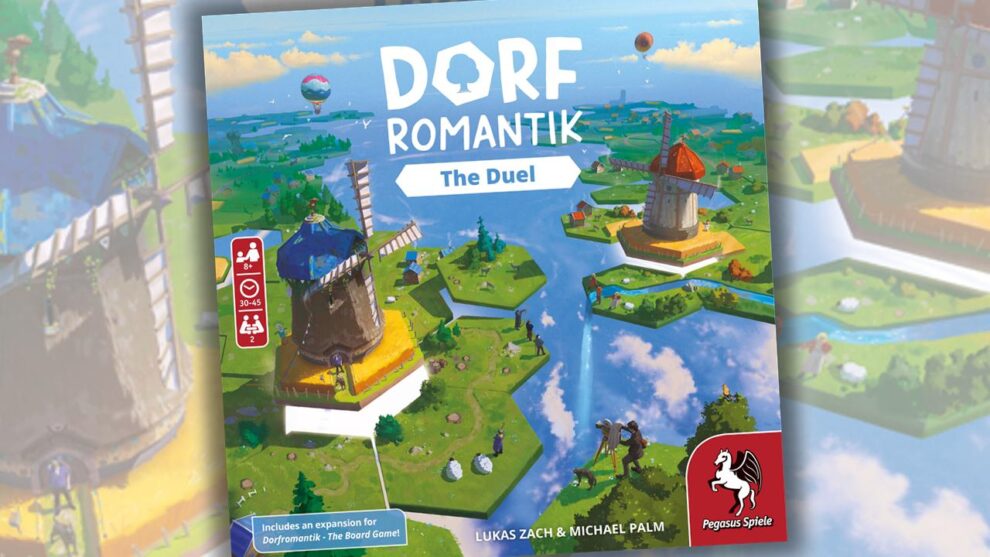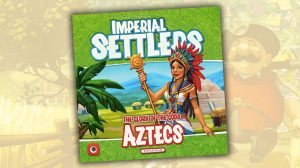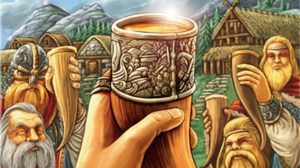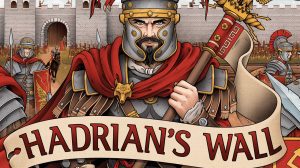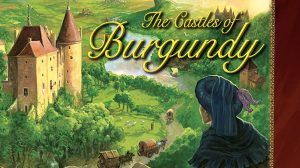Disclosure: Meeple Mountain received a free copy of this product in exchange for an honest, unbiased review. This review is not intended to be an endorsement.
Dorfromantik: the Duel attempts to capture the charm of its namesake Dorfromantik: the Board Game and transform it from an idyllic cooperative venture into a fierce, head-to-head competition. As you’ll soon see: while the game succeeds on most fronts, there are a few aspects of it that I find bothersome. How bothersome? Read on to find out.
How Is This Game Played?
In Dorfromantik: the Duel (Duel), you and your opponent are competing to see which one of you can score the most points. Each player is provided a set of Terrain tiles, a set of Task tiles, and a set of Task markers in their color, and (save for the player color on the back of the tiles) their sets match their opponent’s sets exactly. This is important because one player—who I will refer to as the ‘caller’ (for lack of a better term)—will flip either a Task tile (if either of the two players ever have fewer than three Tasks) or a Terrain tile, and this is the tile that both players must play into their personal tableau. We’ll call the other player the ‘follower’.
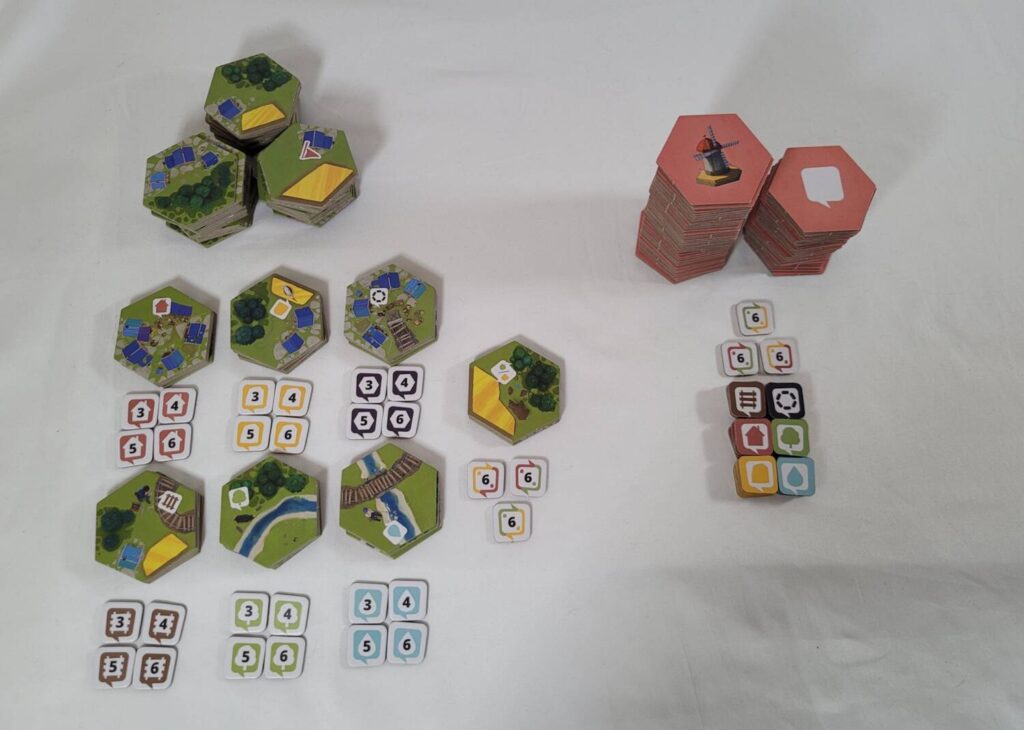
Once all of the Terrain tiles have been played, the game comes to an end and final scoring is performed to determine the winner, which I’ll talk about in more detail momentarily.
With the exception of water and train track terrains, which can only connect to other tiles of the same type, Terrain tiles can be placed willy nilly any which way the players choose, so long as each tile placed is abutting some previously placed tile. This is not advisable, however, as the aim of the game is to complete as many tasks as possible in order to score loads of points.
What Are Task Tiles?
I’ve mentioned Task tiles several times and, unless you’re familiar with Duel’s cooperative namesake, you might be wondering what they are. Task tiles, as their name implies, provide the players with goals they are hoping to achieve for points. These come in two flavors: group-based tasks and flags.
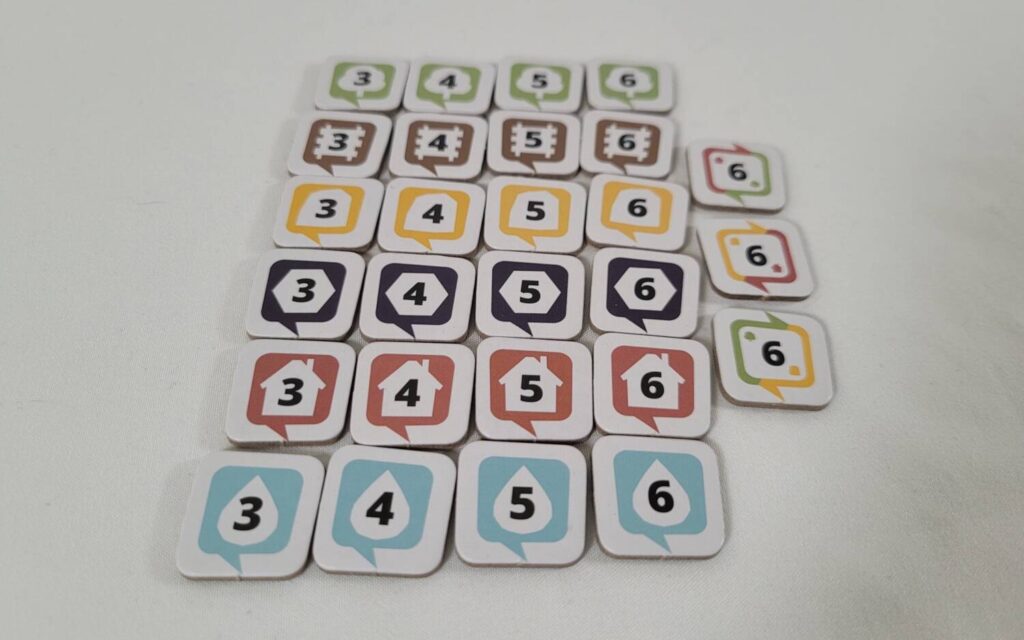
When a new group-based Task tile is brought into play, a matching Task marker is placed on top of it. This Task marker has a number printed on it. This number signifies the exact amount of tiles with that terrain feature that must be connected together in a group in order for that Task tile to be completed. I know that sounds confusing, so let’s consider an example.
Let’s pretend a field terrain Task tile has come into play. The caller then adds a field type Task marker to it from their face down stack of shuffled field terrain Task markers. This Task marker has the number 3 printed on top of it. The follower locates the matching Task tile from their inventory of tiles (which will all be face up) and the matching Task marker. Then, both players place the Task tile and Task marker combination into their own separate tableaus.
Ideally, a player would already have 2 fields already touching one another so that adding the new Task tile, and its marker, would create a set of 3 connected field tiles, allowing them to complete that task immediately. What’s more likely, though, is that they do not and this Task tile will remain in place until some future turn in which the player is able to complete the task by adding the appropriate tile to their tableau.
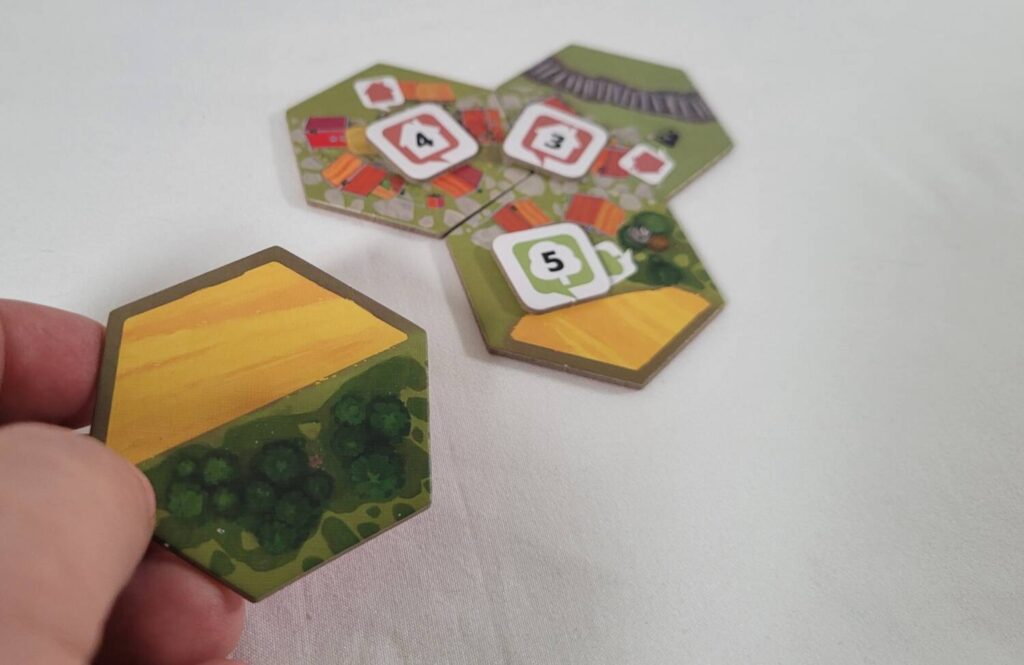
When the task is completed, the player will collect the Task marker and set it off to the side. At the end of the game, it will be worth a number of points equal to the number printed on the Task marker.
Unlike group-based tasks, the second task type (the flags) are added to the game via the regular Terrain tiles. Each flag is attached to a specific type of terrain. If, at the end of the game, the terrain the flag is attached to is completely surrounded (meaning, no more of that terrain type can possibly be added to it), then that flag will score. The amount of points the flag will score is entirely dependent upon how many tiles are used in that terrain cluster. The bigger the cluster, the greater the reward.
So, What’s Bugging Me?
As I hinted earlier, there are a few aspects of Dorfromantik: the Duel that almost make me never want to play it again. For starters, Duel is a table hog. Duel uses the same size tiles as its cooperative namesake. In the cooperative version of the game, the players are adding tiles to a single, shared tableau in the middle of the table. Sure, it can grow in size and certainly, it can get pretty sprawling. But, that’s okay. It’s just one single island.
But, in Duel, that sprawling issue is doubled and can lead to headaches when your island begins to sprawl into your opponent’s area (or vice versa) or, worse, when it reaches the edge of your table and you have to reposition literally everything to fit an extra tile into an otherwise inaccessible spot.
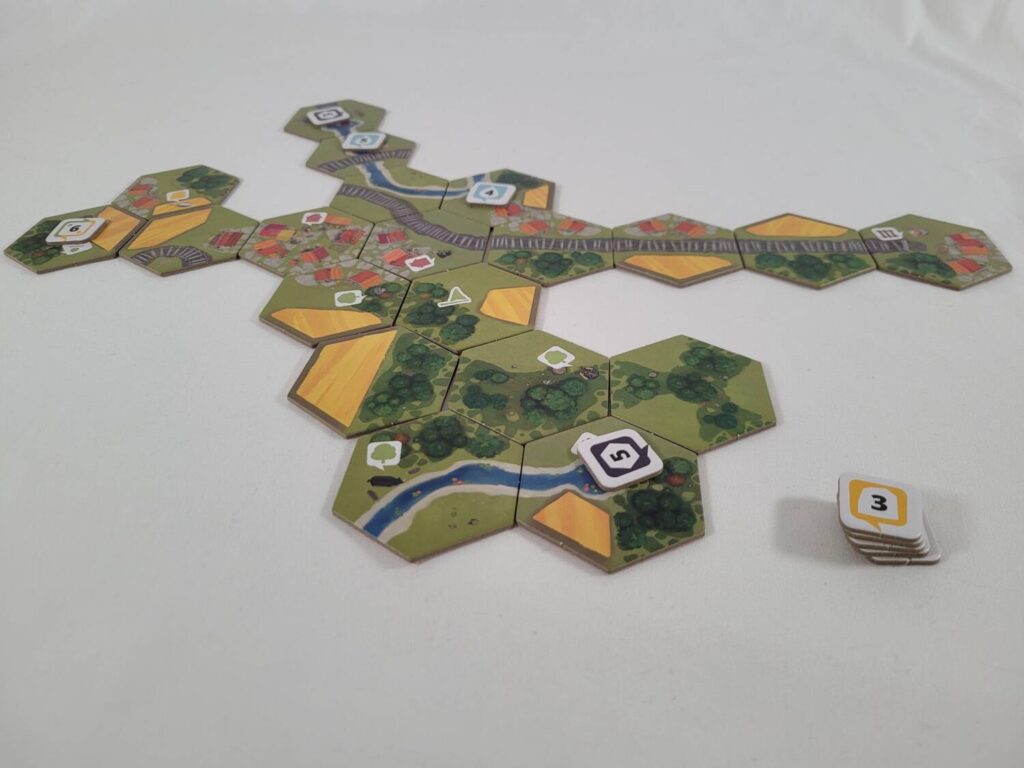
There’s not a whole lot of information on these tiles. I think you could reduce their size significantly and still have an attractive, and playable game.
That issue is further compounded when you figure in the follower having to lay out all of their tiles into face up stacks during setup so that they can more easily find whichever tile the caller has flipped up. This brings me to my second gripe.
Having to find the tile that the caller just flipped up is a real pain in the keister. A lot of the tiles in Duel are very similar to one another. Having to twiddle your thumbs while the other player digs through their tiles really kills the flow of the game.
It seems like an easy enough thing to solve. Instead of letting the players decide who’s going to be the caller, just assign one of the tile decks as the caller deck and the other as the follower deck. Then, number each of the tiles. The follower arranges their stack of Terrain and Task tiles in numeric order. As the caller flips over a tile, they call out the number, and the follower simply pulls out the correctly numbered tile. Easy peasy. Not only does such a simple solution address this issue, but it also addresses the issue that I previously raised about spatial concerns.
My last issue isn’t necessarily a deal breaker, but it could potentially be. In games like this where everyone is having to do something with exactly the same pieces each turn, there’s usually some differentiator in place to ensure that no two players are ever doing exactly the same thing with those pieces. For instance, in Tangram City, each player’s player board has some pre-printed pieces on them, but these pieces are in different spots on each of those boards. Even though the players are having to place down the same pieces, they cannot simply copy one another.
The same cannot be said for Duel. There is no differentiation. If the follower decides to copy the caller, or vice versa, to ensure the game ends in a stalemate, there is nothing in place to prevent this outcome. The only thing I can think of right off the top of my head that could solve this issue would be the inclusion of 2-4 completely different starting tiles that would be randomly distributed between the two players during setup.
In all my games, this scenario has never come to pass, but the fact that it could makes it a thing worth mentioning.
So, You’re Saying You Don’t Like the Game?
While everything you just read may lead you to the conclusion that I’m not a fan of Dorfromantik: the Duel, you would be wrong. I really do enjoy it. Despite all the negative things I had to say, I feel that the game’s positives far outweigh its negatives.
Duel is easy on the eyes. It exudes the same kind of rustic charm that the video game does. The color palette is peaceful. The setting is idyllic. The island you create seems like it would be a nice place to live.
Duel is easy on the clock. A game of Dorfromantik: the Duel only takes about 30 minutes to play. If you’re a parent like me, or find yourself on the business end of some other kind of gaming time crunch, it’s the perfect type of game for stretching those gaming muscles. It’s just short enough that it’s respectful of your time, and it’s got just enough depth that you won’t feel like your time was wasted.
Duel is easy on the mind. The rules are easy to grasp. There’s nothing challenging about the game play. It’s a breezy puzzle that lures you into a state of Zen and never lets you leave it.


